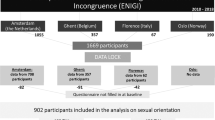Abstract
Transsexuals who had not undergone surgery, although it had been offered to them providing they fulfilled the usual requirements, were classified into various subgroups, measured according to their attitude towards sex reassignment surgery: they were transsexuals with an unaltered wish for surgery, transsexuals who were ambivalent towards surgery (hesitating patients), and transsexuals who had relinquished their wish for surgery and lived in the initial gender role. Whereas transsexuals with an unaltered wish for surgery did not differ substantially from transsexuals who had had surgery, the hesitating patients were noticeably older, more often married, more often had children of their own, their partnerships were of long duration, and exclusively with partners of the opposite biological sex. These characteristics were seen when the diagnosis was first made. They can therefore be considered prognositic criteria for this subgroup. Transsexuals who relinquished their wish for surgery did not differ substantially from transsexuals with an unaltered wish for surgery. The reasons for relinquishing the wish for surgery were indivdual or could not be clearly established. At the time of follow-up, all transsexuals who had not undergone surgery indicated that they were experiencing the same degree of difficulty with respect to social adjustment as at the time of diagnosis. Slight improvements were seen in patients with an unaltered wish for surgery. Significant changes were seen only in transsexuals who had surgery. Transsexuals who have not had surgery and have no present wish for it are in the minority. Hesitating patients have a particular need for psychotherapy.
Similar content being viewed by others
References
American Psychiaric Association (1980).Diagnostic and Statistical Manual of Mental Disorders American Psychiatric Association, Washington, DC.
Blanchard. R., Steiner, B. W., and Clemmensen, L. H. (1985). Gender dysphoria, gender reorientation, and the clinical management of transsexualism.J. Consult. Clin. Psychol. 53: 295–304.
Fahrner, E.-M., and Kockott, G. (1984). Krankheitsbild und therapie der transsexualitat. In Brengelmann, J. C., and Buhringer, G. (eds.),Therapie forschung fur die Praxis 4 G. Röttger, Munchen.
Fahrner, E.-M., Kockott, G., and Duran, G. (1987). Die psychosoziale Integration Transsexueller, eine katamnestische Untersuchung.Nervenarzt. 158: 340–348.
Fleming, M., Steinman, C., and Bocknek, G. (1980). Methodological problems in assessing sex reassignment surgery: A reply to Meyer and Reter.Arch. Sex. Behav. 9: 451–456.
Hunt, D. D., and Hampson, J. L. (1980). Follow-up of 17 biologic male transsexuals after sexreassignment surgery.Am. J. Psychiat. 137: 432–438.
Kröhn, W. (1981). Nachuntersuchungen and bisher nicht operierten Transsexuellen.Mitteil. Ges. Prakt. Sexualmed. 1: 35–36.
Lundström, B. (1981). Gender dysphoria. A social-psychiatric follow-up study of 31 cases not accepted for sex reassignment. Reports from the Department of Psychiatry and Neurochemistry., St. Jorgen's Hospital, University of Goteborg, Sweden, University of Goteborg Press, Hisings Backa, Sweden.
Lundstrom, B., Pauly, I. B., and Walinder, J. (1984). Outcome of sex reassignment surgery.Acta Psychiat. Scand. 70: 289–294.
McCauley, E., and Erhardt, A. A. (1984). Follow-up of females with gender identity disorders.J. Nerv. Mental Dis. 172: 353–358.
Meyer, G. K., and Reter, D. J. (1979). Sex reassignment, follow-up.Arch. Gen. Psychiat. 36: 1010–1015.
Sigusch, V., Meyenburg, B., and Reiche, R. (1979). Transsexualität. In Sigusch, V. (ed.),Sexualität und Medizin Kiepenhauer und Witsch, Köln, Germany.
Walinder, J., Lundström, B., and Thuwe, I. (1978). Prognostic factors in the assessment of male transsexuals for sex reassignment.Brit. J. Psychiat. 132: 16–20.
Author information
Authors and Affiliations
Additional information
Dedicated to Prof. D. Ploog for his 65th birthday.
The study was supported by a grant from the Wilhelm-Sander-Stiftung.
Rights and permissions
About this article
Cite this article
Kockott, G., Fahrner, E.M. Transsexuals who have not undergone surgery: A follow-up study. Arch Sex Behav 16, 511–522 (1987). https://doi.org/10.1007/BF01541715
Issue Date:
DOI: https://doi.org/10.1007/BF01541715




